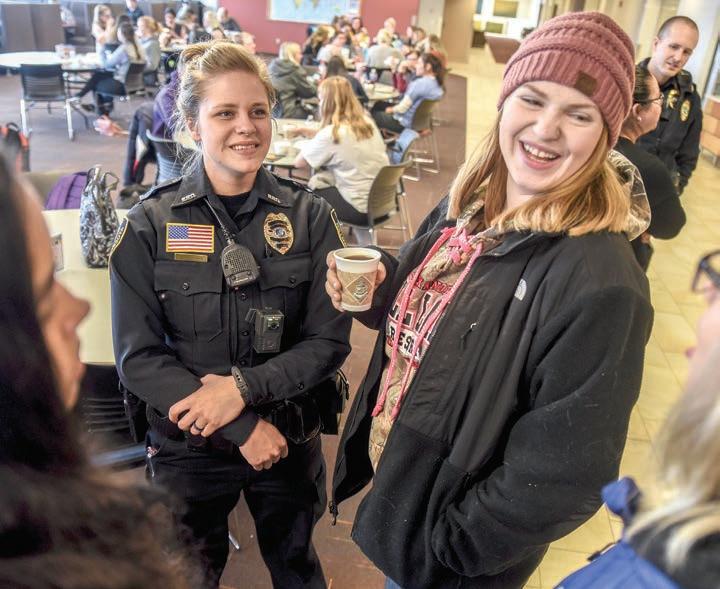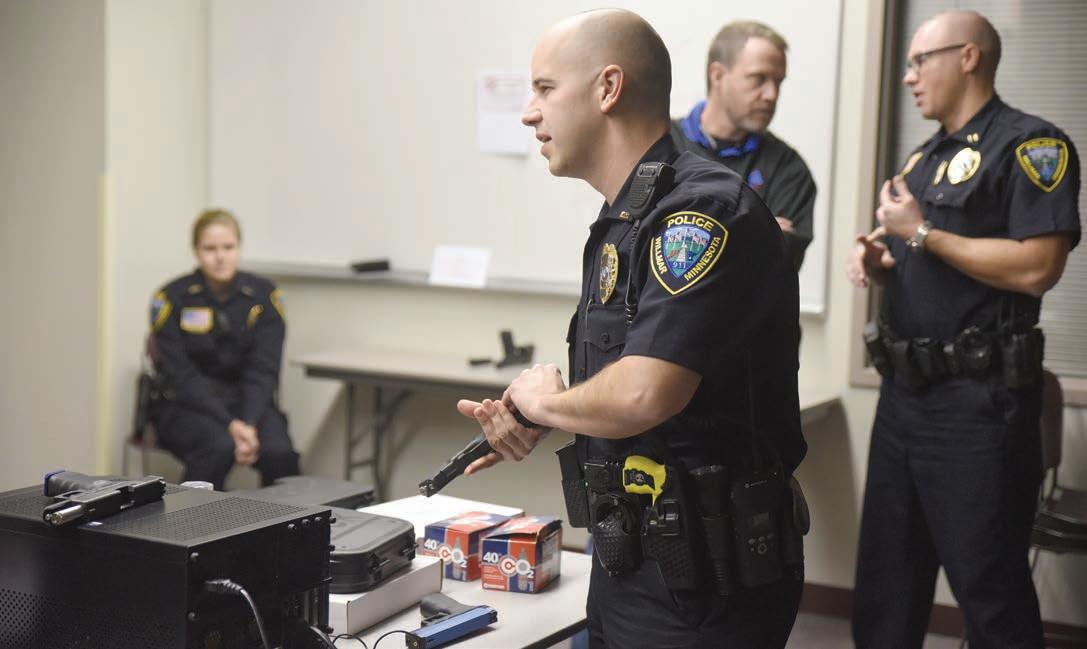
6 minute read
Conforming to changing standards
from Impact 2021
Willmar Police Chief Jim Felt, left, and Kandiyohi County Sheriff Eric Holien pose for a photo outside of the Kandiyohi County Law Enforcement Center in Willmar in January 2019. The police and sheriff’s departments work closely together to respond to the Willmar and area communities’ needs. Erica Dischino / West Central Tribune
Kandiyohi County, Willmar law enforcement institute community-first policing
BY MARK WASSON | West Central Tribune
WILLMAR — Law enforcement around the country has gone through many changes over the last five years and Kandiyohi County is no different.
Throughout a particularly turbulent time, both the Kandiyohi County Sheriff’s Office and the Willmar Police Department have sought to engage the public and address their needs while also conforming to changing standards that flow down from laws and mandates enacted by the legislative and executive branches.
“I think that, right now, policing is in flux a bit. There is a fair amount of confusion in the messages that seem to trend nationally about police,” Willmar Police Chief Jim Felt wrote in an email. “Some want less police presence and interaction. Some want more.
“Legislatures struggle with things like potential legalization of controlled substances and enforcement of specific crimes. Courts and legislatures are making constant changes to offenses and sentencing that affect what and how things get enforced. Police are reactive on not only what the public does, wants and needs, but also what our lawmakers decide,” Felt wrote.
Policing strategies respond to public’s wants and needs
When asked about his views on policing. Felt often speaks about Robert Peel, a 19th-century former British prime minister who is considered the father of modern policing. Peelian principles dictate a policing-by-consent, professional law enforcement agency that relies on new technology and well-trained officers who gain the trust of the public.
This is why Felt’s department has made many technological upgrades such as the addition of body-worn cameras and drones as investigative tools. Department-owned smartphones are issued to all officers. The department has updated to lighter body armor that offers more protection and replaced some squad cars with hybrid Ford Police Interceptor SUVs. Officers have received increased training in DNA evidence, use-of-force via simulators and there has been additional de-escalation training.
“Locally, we feel that we have a much clearer view of what people in our community want from the police and the expectations of our department. We work to provide those services in a timely, professional, fair and cost-effective manner and adapt to the changes,” Felt wrote. “We continually strive to live up to our mission statement of ‘The Willmar Police Department is dedicated to providing fair and impartial police services to all members of the public through education and enforcement.’ We’ve worked hard to build community connections and trust and realize that must be continually communicated and maintained.”
One part of reaching out to the community was instituting Coffee with Cops, a program that has law enforcement officers visiting various coffee shops to speak with members of the community about any questions or concerns.
This type of community outreach is shared with Kandiyohi County Sheriff Eric Holien. The two departments work closely together, often sharing equipment, resources and manpower while sharing the same office building in Willmar.

Willmar Police Officer Nicole Wortham, left, and Willmar Community Service Officer and student Hana DeSchepper chat with other students at Ridgewater College in Willmar during the January 2020 Coffee with Cops event. Uniformed and non-uniformed officers had the opportunity to chat with students and staff to spark conversation about community topics and answer questions over coffee and cookies.
Erica Dischino / West Central Tribune
The Sheriff’s Office also utilizes Facebook to get information out to the public and to be open about what the office is doing.
“We want to make sure that we’re breaking down the barriers as to some of the negative connotations you see about law enforcement,” Holien said. “So we want to make sure that the public understands that there’s a small fraction of bad officers, but the large majority, we’re out there, we’re working for the community, we’re doing everything we can for them. We want them to understand that we’re not perfect, but we will try to be the best that we can be.”
Holien said the Sheriff’s Office also takes advantage of additional training in cultural diversity, crisis intervention, conflict management, de-escalation and one of the newer trainings: how to respond to someone who is autistic. The Minnesota Board of Peace Officer Standards and Training required departments to do 16 hours of this training over the course of three years. The Sheriff’s Office did it in one.
“We wanted to set the precedence for our agency (for them to) understand this is a priority, not only for the community but also for us,” Holien said.
As far as addressing community needs, it can be a mixed bag, according to Felt.
“Some community needs that have been relayed to us are as specific as extra patrol in problem areas or enforcement of ordinances of specific concern. Most have been things that we felt best met the desires of the greater Willmar community such as community involvement, encouraging communication between the public and police, meeting expectations such as transparency of how we do business, investigative follow-up, crime prevention, sharing of information when possible and the like,” Felt wrote.
“WPD tries to be forward thinking and proactive in investigations and developing community connections.”

Officer and Use of Force Instructor Ross Livingood holds a pistol, which has sensors that detect where the shot was aimed, used for Willmar Police Department’s simulator, in October 2017. The simulator helps to train officers in situations where they would need to conduct use of force.
Erica Dischino / West Central Tribune
An educational approach to 2020
In the midst of a worldwide pandemic, civil unrest impacted the region and the world in a way that hasn’t been seen in decades.
While the Twin Cities saw civil unrest over the summer of 2020, Willmar and the surrounding area largely did not. Sheriff’s deputies were sent to help local law enforcement in Minneapolis after George Floyd was killed in May 2020 by Minneapolis police officer Derek Chauvin.
And while law enforcement was put in the unique position of responding to mask mandates and business closures ordered by the state amid the COVID-19 pandemic, in the region, law enforcement took an educational approach, although executive orders signed by Gov. Tim Walz allowed arrest.
Holien said in a February interview that his office had to strike a balance between public safety and ensuring everyone’s rights are protected.
“It’s the first that I can remember in my lifetime that we’ve had to deal with a pandemic to this extent,” Holien said.
For example, the Kandiyohi County Sheriff’s Office would pass on reports of businesses violating COVID-19 restrictions to the state but would respond to requests to remove people from businesses for violating COVID-19 restrictions.
This type of community approach to enforcement was also practiced at a number of protests in the region, with sheriff’s deputies and police officers monitoring protests and rallies but never having the need to intervene.
Hiring continues to be a challenge
Holien said that his office has had a hiring problem so far in 2021.
“When I applied here, there was at least 70 applicants and there were times before that we were looking at 120 applicants for one position,” Holien said. “Now we have positions open and we’re lucky if we’re getting 25. The hard part is, not only are we getting lower numbers, but the quality of the applicants that we also have, we’re looking at people that we wouldn’t look at before.”
Part of the Sheriff’s Office plan to mitigate that was instituting a Sheriff’s Reserve program, which encourages college-level students to become potential applicants later and strengthen the recruitment base.
The program allows volunteers to pre-train before going out on patrol by helping out with community events and assisting in traffic control.
As far as the future, Holien said the pendulum is swinging toward community service right now and that historically it will swing back to enforcement before public opinion demands it swing back to community service.
“What we try to do is find that balance, you got to have community service but you have to be firm,” Holien said. “So that’s that delicate balance you want and you have to be cautious and I always tell people, ‘Be careful what you wish for,’ because that pendulum swinging hard in one way right now; it has the potential to swing back hard the other direction.”
You may contact the author at mwasson@wctrib.com.

Student Ayden Schuler speaks with Willmar Police Sgt. Mike Jahnke at Ridgewater College in Willmar during the January 2020 Coffee with Cops event. Uniformed and non-uniformed officers had the opportunity to chat with students and staff to spark conversation about community topics and answer questions over coffee and cookies.
Erica Dischino / West Central Tribune










